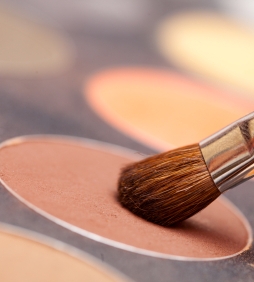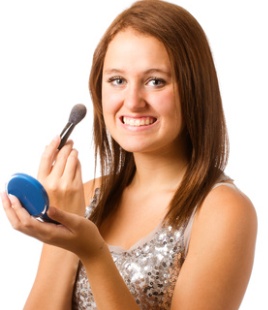
What’s the best makeup for acne-prone skin? We’ll tell you about some things to look for when selecting cosmetics and also tell you which brand of makeup we like best. Choosing the right makeup is important if you’ve got acne-prone skin because makeup can worsen acne.
It should be noted that just trying to use makeup to hide acne is not a good idea, because that doesn’t treat the acne and it often ends up making it worse. Makeup isn’t a substitute for acne treatment. In addition, if you’re going to use makeup when you’re having an acne outbreak, you need to choose the makeup that won’t worsen your condition, even if it doesn’t do as good a job at hiding the acne. In the end, it’s better to be seen with acne for a short while than to develop more severe acne that will last much longer, be harder to treat, and may leave lasting scars.
Choosing The Best Makeup For Acne
Here are some tips to help you select the best makeup for your acne-prone skin.
- Look for oil-free, or water-based, cosmetics, which won’t clog pores like oily cosmetics will. The label might say “noncomedogenic.”
- If you have sensitive skin, look for makeup designed for sensitive skin or “hypoallergenic” makeup.
- Look for an oil-free moisturizer with sunscreen. Excessive exposure to the sun can cause acne in some people. In addition, some acne medications make people more sensitive to sunlight. For these reasons, it’s especially important to use sunscreen regularly if you are prone to acne.
- Use an oil-free makeup remover, as well.
- Pay attention to how makeup affects your acne. If it seems to make it worse, don’t use it.
- Consult a dermatologist if you have questions about the best makeup for acne, especially if you have severe acne. It may be necessary to avoid makeup altogether for a while when getting treatment for severe acne, but you should be able to use noncomedogenic makeup after your acne improves a bit.
Other Acne Makeup Tips

In addition to choosing the right makeup for acne, you can reduce the likelihood of developing acne or encourage acne to heal by doing the following things.
- Wash your face well with a mild soap or cleanser and water before applying makeup.
- Use minimal makeup. The more makeup you use, the more likely it is to cause acne or other skin problems, especially if you are acne-prone or have particularly sensitive skin.
- Throw out old makeup. Manufacturers are not required to put an expiration date on makeup, although some do, even if there is no expiration date, makeup does not keep forever. Using outdated makeup can contribute to acne because you can actually end up applying bacteria to your face. Use foundation within six months of opening it and use powdered blush and eye shadow within one year.
- Clean makeup brushes and applicators regularly with mild soap and water to eliminate acne-causing bacteria.
- Take off your makeup before bed. Sleeping with makeup on can cause clogged pores, which in turn can cause acne. Use an oil-free makeup remover or a mild soap or cleanser and water to remove makeup.
- Avoid oily hair care products, as well as oily makeup. While you don’t apply hair care products to your face, they can still cause acne, especially on the upper forehead.
The Best Makeup For Acne
The best acne makeup we’ve been able to find is from Clinique. Clinique makeup for acne is oil-free (non-comedogenic), so it won’t clog your pores and make your acne worse. Instead, it contains ingredients that help fight or prevent acne while giving you the look you want from a good makeup. Clinique offers a number of cosmetics designed for people that are prone to acne. To learn more, just follow this link to Amazon.com to view the Clinique products designed for acne-prone skin. We also find reviews on Amazon to be very informative.
